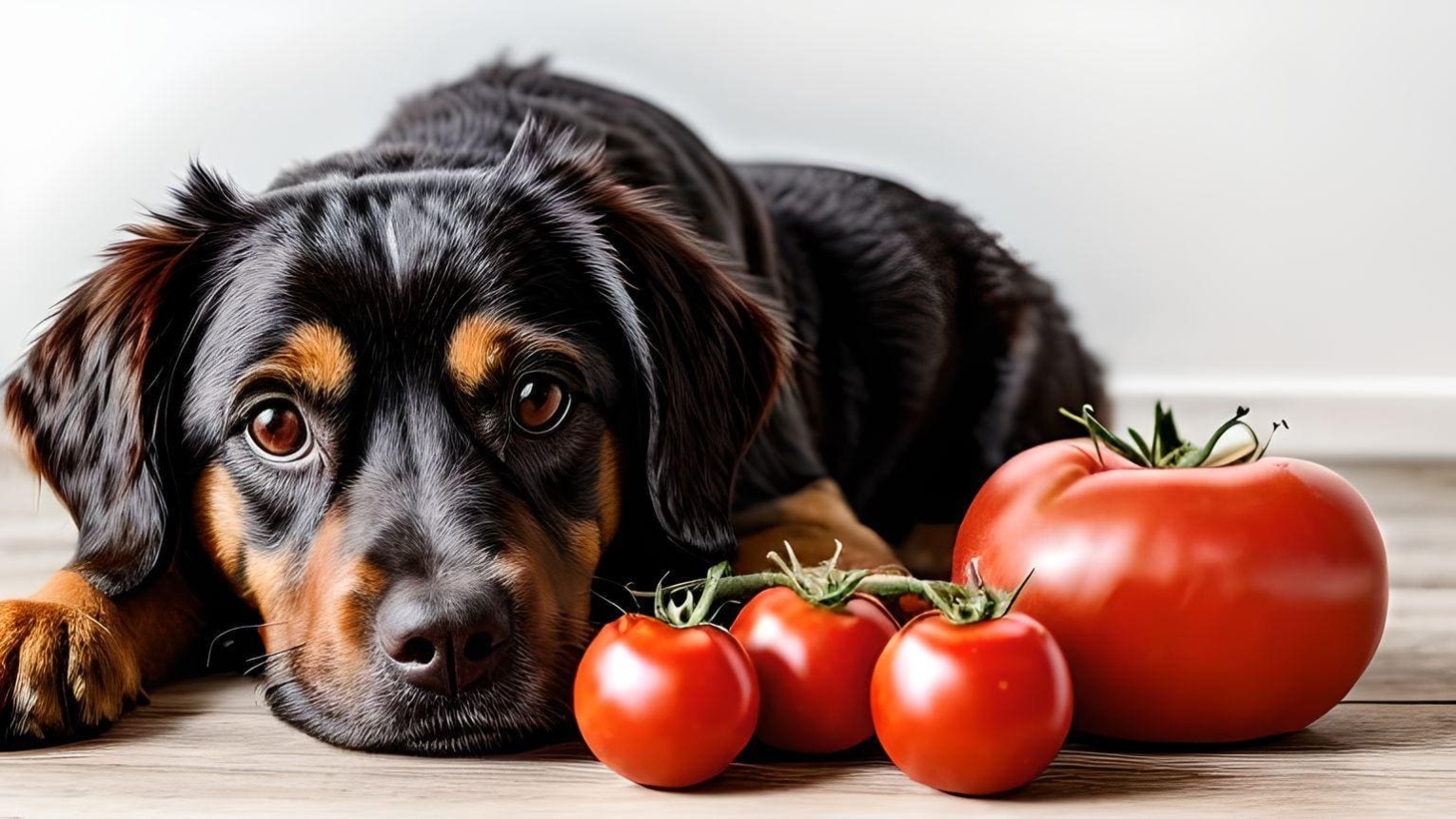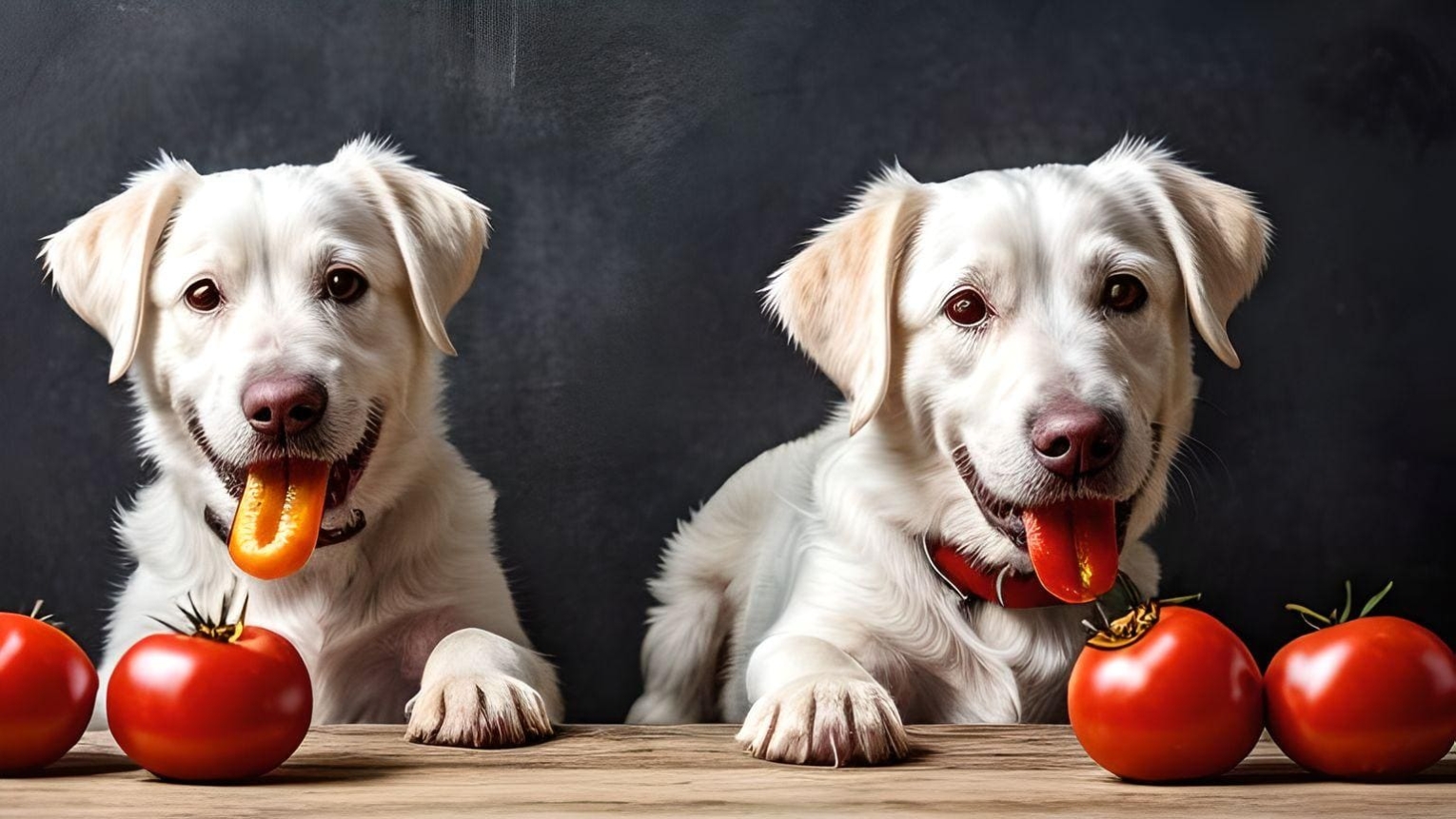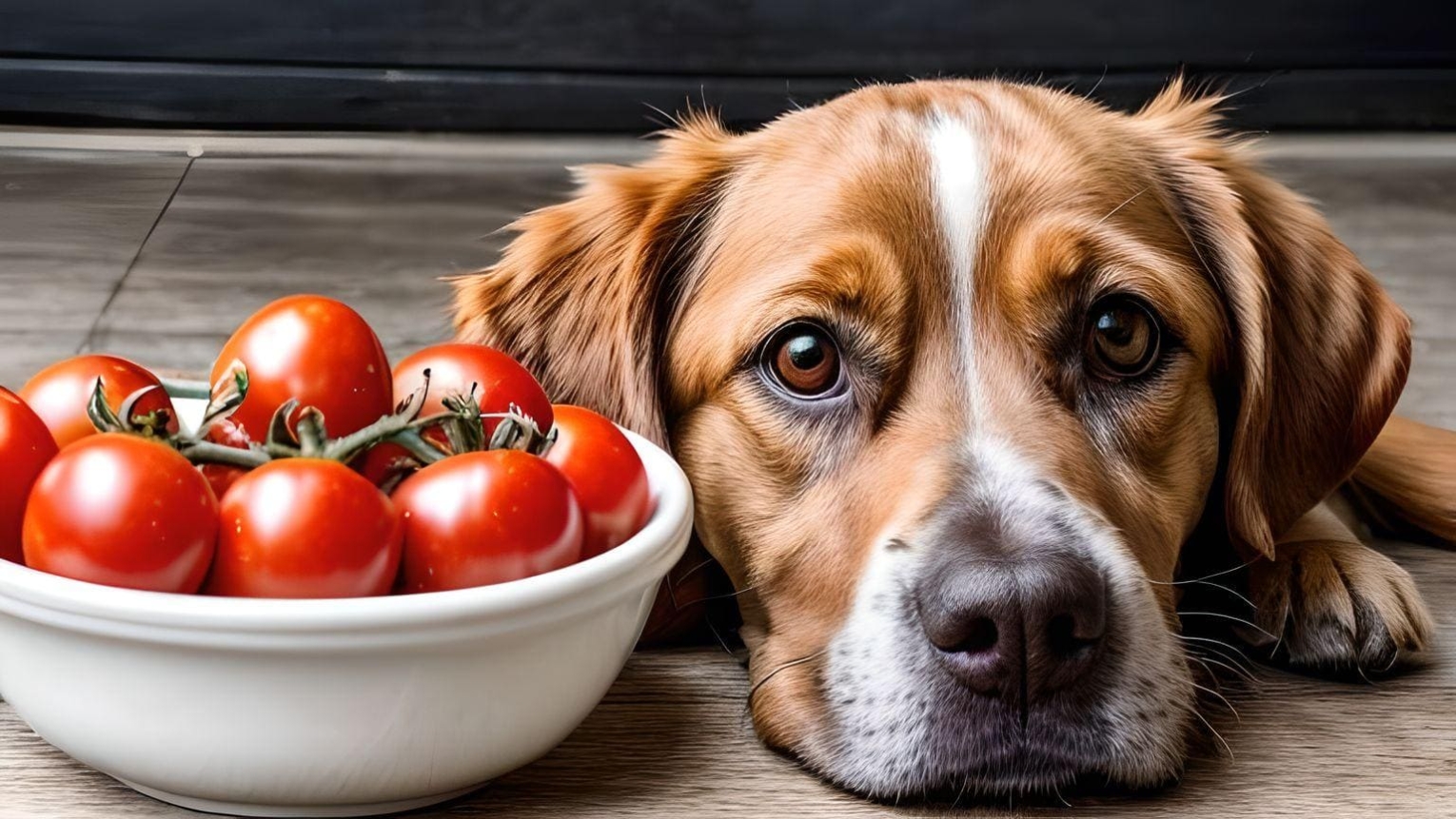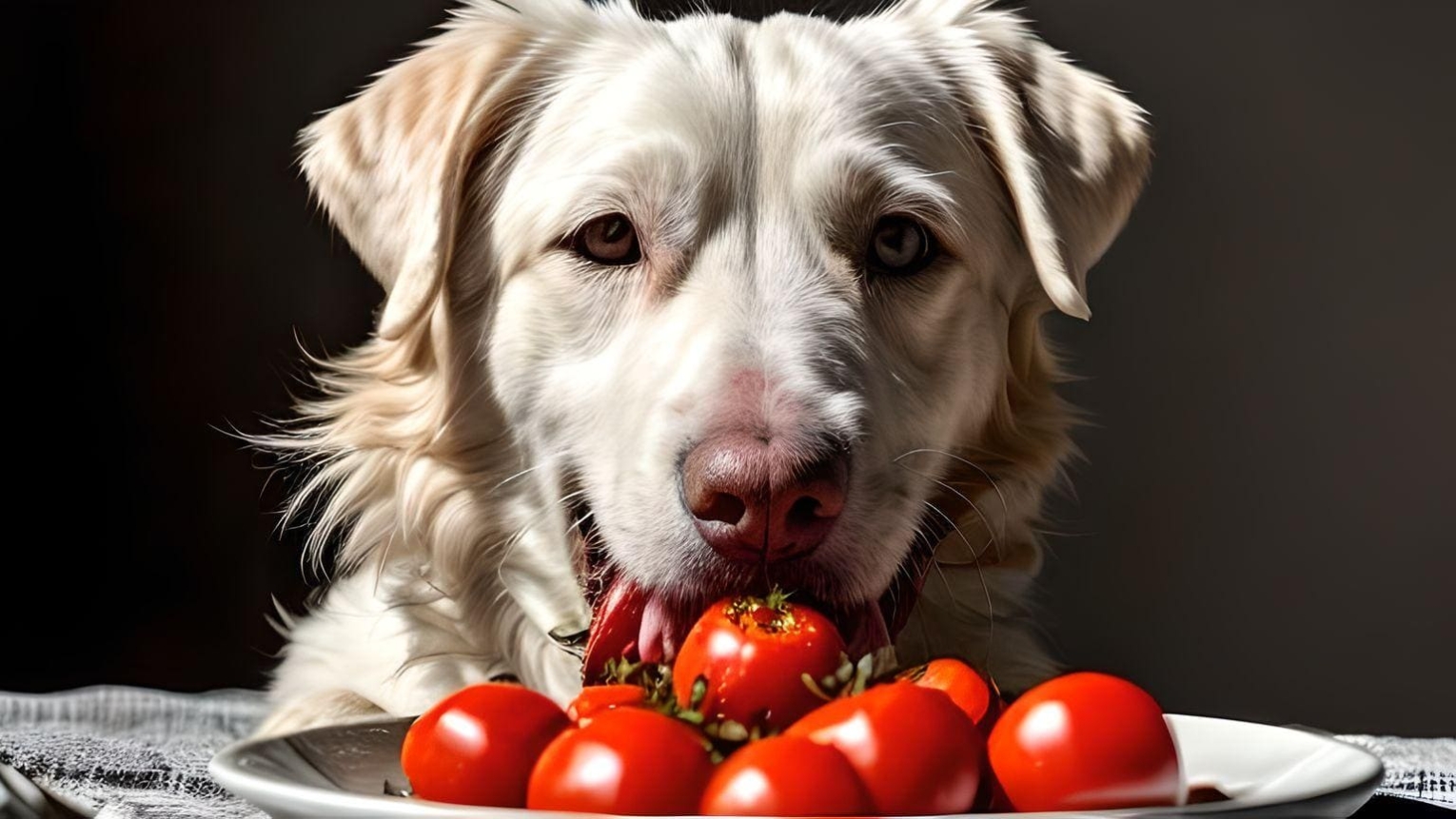Can Dogs Eat Tomatoes | Is it Safe? 5 Benefits, Risks, Health Issues
In the world of pet nutrition, one question that often arises is whether dogs can safely consume tomatoes. These vibrant red fruits are a common sight in our kitchens, but what do they mean for our four-legged companions? This in-depth article is dedicated to exploring the topic of “Can dogs eat tomatoes?”
Can Dogs Eat Tomatoes?
Yes, dogs can eat tomatoes, but it should be done in moderation and with certain precautions. Tomatoes are not toxic to dogs, but they do contain a substance called solanine, which can be harmful in large amounts. Solanine is primarily found in the green parts of the tomato plant, such as the stems and leaves, and in unripe green tomatoes.
Ripe red tomatoes have much lower levels of solanine and are generally safe for dogs to consume in small quantities. However, some dogs may be more sensitive to tomatoes and can experience digestive upset or allergies.

It’s essential to prepare tomatoes properly if you want to give them to your dog. Make sure to remove any green parts, stems, and leaves, and feed your dog only the ripe flesh in small, bite-sized pieces. Additionally, avoid adding any seasonings, salt, garlic, or onions, as these can be harmful to dogs.
If you’re unsure about how your dog will react to tomatoes or if they have any underlying health conditions, it’s a good idea to consult with your veterinarian before adding tomatoes or any new food to their diet. Always introduce new foods gradually to monitor your dog’s reaction and ensure they don’t experience any adverse effects.
Can Dogs Eat Cherry Tomatoes?
Yes, dogs can safely consume ripe cherry tomatoes. These small, bite-sized tomatoes can make for a tasty and healthy treat for your furry friend. However, it’s important to remove any green parts, stems, or leaves, as they can contain solanine, a potentially toxic substance. Introduce them gradually to ensure your dog tolerates them well.
Can Dogs Eat Tomato Sauce?
Tomato sauce can be problematic for dogs, primarily due to common additives like garlic and onions, which are toxic to them. Additionally, many tomato sauces contain added seasonings, salt, and sugar, making them unsuitable for your pet. It’s best to avoid sharing tomato sauce with your dog.
Can Dogs Eat Tomato Soup?
Tomato soup recipes often include a variety of ingredients that can be harmful to dogs. These might include seasonings, onions, and even heavy cream or other dairy products that can upset your dog’s stomach. It’s safer to keep tomato soup for human consumption and provide dog-safe treats for your pet.
Can Dogs Eat Grape Tomatoes?
Ripe grape tomatoes, when properly prepared, can be given to dogs as an occasional treat. They are a smaller and convenient option for dogs, but like all tomatoes, it’s important to remove the green parts and serve them in moderation.
Can Dogs Eat Tomatoes Raw?
Dogs can safely enjoy raw tomatoes in moderation. Ripe red tomatoes are generally considered safe for dogs, but they should be served without green parts, stems, or leaves. Overindulgence may lead to digestive issues, so small amounts are best.

Can a Dog Eat Cherry Tomatoes?
Cherry tomatoes are suitable for dogs when ripe and the green portions are removed. Their small size makes them an ideal option for smaller breeds or as training treats, but the same rules regarding moderation apply.
Can Dogs Eat Green Tomatoes?
Green tomatoes, especially when unripe, contain higher levels of solanine, which can be toxic to dogs. They should be avoided. Only offer your dog ripe, red tomatoes as a safe and healthy treat.
Can Dogs Eat Cooked Tomatoes?
Plain, cooked tomatoes can be safe for dogs when prepared without harmful additives, such as seasonings, garlic, or onions. Cooking tomatoes can break down some of the potentially harmful compounds found in raw tomatoes. Always serve them in moderation.
Can Dogs Eat Lettuce and Tomatoes?
Dogs can have plain, ripe lettuce and tomatoes, though neither vegetable offers substantial nutritional value for them. These can be given in small quantities as occasional treats. Make sure there are no harmful toppings, dressings, or seasonings when offering these vegetables.
Can Dogs Eat Tomato Paste?
Tomato paste is highly concentrated and may contain additives, salt, and seasonings, which are not suitable for dogs. It’s best to avoid feeding tomato paste to your dog.
Can Dogs Eat Onions and Tomatoes?
Onions are toxic to dogs, and even a small amount can be harmful. If a dish contains both onions and tomatoes, it’s not safe for your dog to consume. Exercise caution and avoid sharing any human food that may contain onions.
Can Dogs Eat Sun-Dried Tomatoes?
Sun-dried tomatoes are typically very concentrated and can be high in salt and seasonings. They are not recommended for dogs due to these additives.
Can Dogs Eat Pasta with Tomato Sauce?
Plain cooked pasta and plain tomato sauce, in small quantities, may be safe for dogs. However, you should ensure that there are no harmful ingredients, such as garlic or onions, in the sauce. Feeding pasta should be an occasional treat.
Can Dogs Eat Canned Tomatoes?
Canned tomatoes often contain added salt and may include other ingredients that are not suitable for dogs. It’s best to avoid canned tomatoes and opt for fresh, plain tomatoes when sharing a treat with your pet.
Can Dogs Eat Cucumbers and Tomatoes?
Both cucumbers and tomatoes, when plain and ripe, can be given to dogs as an occasional treat. These vegetables are generally safe options for dogs, though they should not be a primary source of nutrition.

Can Dogs Eat Sardines in Tomato Sauce?
Sardines in tomato sauce may be too salty and contain other seasonings not suitable for dogs. It’s best to choose plain sardines in water if you want to share this food with your dog.
Can Dogs Eat Spaghetti with Tomato Sauce?
Plain cooked pasta and plain tomato sauce, in small quantities, may be safe for dogs. Ensure there are no harmful ingredients, such as garlic or onions, in the sauce. Feeding spaghetti should be an occasional treat.
Can Dogs Eat Fried Green Tomatoes?
Fried green tomatoes are not recommended for dogs due to the frying process, which adds extra fat and calories. The breading may not be easily digestible, and they often contain seasonings that are not safe for dogs. It’s best to avoid sharing fried green tomatoes with your pet.
Are Tomatoes Safe for Dogs?
Tomatoes, being a part of the nightshade family, come with certain complexities when it comes to their suitability for dogs. Let’s delve into the intricacies.
Nutritional Content of Tomatoes:
Tomatoes are known for their rich nutritional profile, featuring vitamins A, C, and K, along with essential minerals like potassium and folate.
- Vitamins and Minerals: The vitamins and minerals found in tomatoes can contribute positively to a dog’s overall health. Vitamin C, for example, supports the immune system, while vitamin A is vital for vision.
Potential Dangers of Tomatoes for Dogs:
Despite their nutritional value, tomatoes harbor substances that can be potentially harmful to dogs if consumed in excess.
- Solanine and Tomatine: Solanine and tomatine are alkaloids present in the leaves and stems of the tomato plant. These compounds can be toxic to dogs and should be avoided.
Moderation is Key:
As with many foods, the key to safely including tomatoes in your dog’s diet is moderation. Small amounts of ripe, red tomatoes are generally safe for dogs, while excessive consumption should be avoided.
Cooked vs. Raw Tomatoes:
Cooking tomatoes can be a safer option for dogs compared to serving them raw. Cooking can break down some of the harmful compounds, making them less potent.

Health Benefits of Tomatoes for Dogs:
Tomatoes also have potential health benefits for dogs when consumed in a controlled manner.
- Antioxidants: The presence of antioxidants in tomatoes can help neutralize free radicals in a dog’s body, contributing to their overall well-being.
- Lycopene: Lycopene, a powerful antioxidant found in tomatoes, is associated with a reduced risk of chronic diseases in humans. While dogs don’t benefit from lycopene in the same way, its presence can still be advantageous.
How to Safely Introduce Tomatoes to Your Dog’s Diet:
If you’re keen on introducing tomatoes into your dog’s diet, there are specific guidelines to follow for their safety.
- Serving Suggestions: To ensure your dog’s safety, consider serving small, bite-sized pieces of tomato. This reduces the risk of choking and overconsumption.
- Tomato-Based Recipes: You can also prepare homemade dog treats or meals using tomatoes as an ingredient, but make sure to follow recipes that are suitable for canine consumption.
Precautions and Allergies:
It’s essential to exercise caution and be aware of potential allergies when feeding your dog tomatoes.
- Allergic Reactions: Some dogs may be allergic to tomatoes. Watch out for signs of allergies, such as itching, skin rashes, or digestive distress, and consult your veterinarian if these symptoms arise.
Other Dog-Friendly Fruits and Vegetables:
If you’re uncertain about tomatoes or wish to diversify your dog’s diet, there are plenty of other fruits and vegetables to consider.
Consulting Your Veterinarian:
When in doubt about your dog’s dietary choices, consulting your veterinarian is always a wise decision. They can provide personalized advice based on your dog’s specific needs and health status.
Incorporating Tomatoes into Homemade Dog Food:
For those who prepare homemade dog food, incorporating tomatoes can be a flavorful addition. However, always be mindful of portion sizes and cooking methods.
Tomatoes in Commercial Dog Food:
Many commercial dog food brands include tomatoes in their formulations. When purchasing dog food, check the label for tomato content and ensure it aligns with your dog’s dietary requirements.
Conclusion: The Tomato Verdict for Dogs
In conclusion, dogs can safely enjoy tomatoes when they are introduced responsibly and in moderation. However, vigilance is necessary to ensure their well-being. Always prioritize your dog’s health and monitor their responses to new foods.
The Benefits of Tomatoes for Dogs

Antioxidants for Canine Health
Tomatoes contain a range of antioxidants, including vitamin C and lycopene. These antioxidants play a role in neutralizing harmful free radicals in a dog’s body. While dogs produce their own antioxidants, the extra boost from tomatoes can support their overall health. Antioxidants are particularly important in counteracting the effects of aging and maintaining a strong immune system.
Lycopene: A Protective Compound
Lycopene, a carotenoid pigment responsible for the red color of tomatoes, has been associated with various health benefits in humans. While dogs don’t metabolize lycopene in the same way, it can still offer some advantages. Lycopene is known for its potential to reduce the risk of chronic diseases in humans, and its presence in tomatoes can have mild anti-inflammatory properties for dogs.
Tomato Recipes for Dogs
Tomato and Chicken Stew
A delicious and nutritious option for your furry friend is a homemade tomato and chicken stew. Here’s a simple recipe:
Ingredients:
- 1 cup of diced, ripe tomatoes
- 1 cup of diced chicken (cooked)
- 1/2 cup of cooked brown rice
- 1/4 cup of peas
- 1/4 cup of carrots
- 1/4 cup of spinach
- 1 tablespoon of olive oil
- 2 cups of water or low-sodium chicken broth
Instructions:
- In a large pot, sauté the diced tomatoes in olive oil until they are soft.
- Add the cooked chicken and cook for a few minutes.
- Add water or low-sodium chicken broth and bring the mixture to a boil.
- Stir in the brown rice, peas, carrots, and spinach.
- Simmer the stew for about 15-20 minutes until the vegetables are tender and the flavors meld.
- Let it cool before serving to your dog.
Tomato and Tuna Treats
For a savory snack, you can create tomato and tuna treats. Here’s a simple recipe:
Ingredients:
- 1 can of tuna in water (drained)
- 1/2 cup of diced ripe tomatoes
- 1 egg
- 1 cup of whole wheat flour
Instructions:
- Preheat your oven to 350°F (175°C).
- In a food processor, combine the tuna and diced tomatoes until well blended.
- Add the egg and blend again.
- Gradually add the whole wheat flour until a dough forms.
- Roll out the dough on a floured surface and cut it into small shapes using cookie cutters or a knife.
- Place the treats on a baking sheet and bake for about 20-25 minutes or until they turn golden brown.
- Let them cool completely before serving to your dog.
Commercial Dog Food with Tomatoes
Label Checking for Tomato Content
When shopping for commercial dog food, it’s essential to check the label for tomato content. Many high-quality dog food brands incorporate tomatoes into their formulations due to the nutritional benefits they offer. However, ensure that the tomato content is appropriate for your dog’s specific dietary needs.
Balanced Diet Considerations
If you choose to include commercial dog food with tomatoes, it’s vital to consider the overall balance of your dog’s diet. Ensure that the food provides the necessary nutrients, and always follow the recommended serving sizes based on your dog’s age, size, and activity level.
FAQs about Dogs and Tomatoes:
-
Can dogs eat cherry tomatoes?
Yes, dogs can eat cherry tomatoes, but in moderation. The same rules for serving tomatoes apply to cherry tomatoes – small, bite-sized pieces are best.
-
Are there tomato-based dog treats available?
Yes, there are commercial dog treats that contain tomatoes as an ingredient. Always read the ingredients label and consult your vet to ensure the treats are suitable for your dog.
-
Can dogs eat tomato sauce or ketchup?
Tomato sauce and ketchup often contain added ingredients like salt and sugar, which are not suitable for dogs. It’s best to avoid giving them these condiments.
-
Can dogs eat green tomatoes?
Green tomatoes contain higher levels of solanine and tomatine, making them riskier for dogs. It’s best to avoid feeding green tomatoes to your dog.
-
What are the signs of tomato poisoning in dogs?
Signs of tomato poisoning in dogs may include drooling, vomiting, diarrhea, lethargy, and, in severe cases, more serious symptoms like tremors or seizures. If you suspect tomato poisoning, contact your veterinarian immediately.
-
How can I tell if my dog is allergic to tomatoes?
Watch for signs of allergies in your dog, such as itching, skin rashes, digestive distress, or unusual behavior. If you suspect an allergic reaction, consult your veterinarian for guidance.
-
Are there any dog breeds that are more sensitive to tomatoes?
While sensitivity to tomatoes can vary among individual dogs, some breeds may be more prone to food allergies and sensitivities. Breeds with sensitive digestive systems, like Bulldogs and Boxers, may be more affected.
-
Can puppies eat tomatoes?
Puppies have delicate digestive systems, and it’s best to introduce new foods cautiously. Wait until your puppy is at least six months old before offering tomatoes in small, manageable quantities.
-
Can senior dogs benefit from tomatoes?
Tomatoes’ antioxidants can be especially beneficial for senior dogs to counteract the effects of aging. However, senior dogs may have more sensitive stomachs, so consult your vet before making significant dietary changes.
-
What’s the best way to introduce tomatoes to my dog’s diet?
Start with a small, ripe piece of tomato and observe your dog for any adverse reactions. If they tolerate it well, you can gradually increase the amount while ensuring it remains a minor part of their diet.
Recommended:
Can Dogs Eat Mango | Is Mango Safe for Dogs? Health Issue, Care Tips
Can Dogs Eat Popcorn | Is it Safe? 4 Benefits, Safety, Health Issues





























